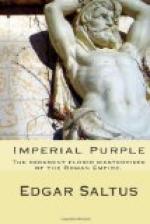One day the senate assembled at his command. They were to sign a decree creating him king. In order not to, Suetonius says, they killed him, wounding each other in the effort, for Caesar fought like the demon that he was, desisting only when he recognized Brutus, to whom, in Greek, he muttered a reproach, and, draping his toga that he might fall with decency, sank backward, his head covered, a few feet from the bronze wolf that stood, its ears pointed at the letters S. P. Q. R. which decorated a frieze of the Curia.
Brutus turned to harangue the senate; it had fled. He went to the Forum to address the people; there was no one. Rome was strangely empty. Doors were barricaded, windows closed. Through the silent streets gladiators prowled. Night came, and with it whispering groups. The groups thickened, voices mounted. Caesar’s will had been read. He had left his gardens to the people, a gift to every citizen, his wealth and power to his butchers. The body, which two slaves had removed, an arm hanging from the litter, had never been as powerfully alive. Caesar reigned then as never before. A mummer mouthed:
“I brought them life, they gave me death.”
And willingly would the mob have made Rome the funeral pyre of their idol. In the sky a comet appeared. It was his soul on its way to Olympus.
II
CONJECTURAL ROME
“I received Rome in brick; I shall leave it in marble,” said Augustus, who was fond of fine phrases, a trick he had caught from Vergil. And when he looked from his home on the Palatine over the glitter of the Forum and the glare of the Capitol to the new and wonderful precinct which extended to the Field of Mars, there was a stretch of splendor which sanctioned the boast. The city then was very vast. The tourist might walk in it, as in the London of to-day, mile after mile, and at whatever point he placed himself, Rome still lay beyond; a Rome quite like London—one that was choked with mystery, with gold and curious crime.
But it was not all marble. There were green terraces and porphyry porticoes that leaned to a river on which red galleys passed; there were theatres in which a multitude could jeer at an emperor, and arenas in which an emperor could watch a multitude die; there were bronze doors and garden roofs, glancing villas and temples that defied the sun; there were spacious streets, a Forum curtained with silk, the glint and evocations of triumphal war, the splendor of a host of gods, but it was not all marble; there were rents in the magnificence and tatters in the laticlave of state.




